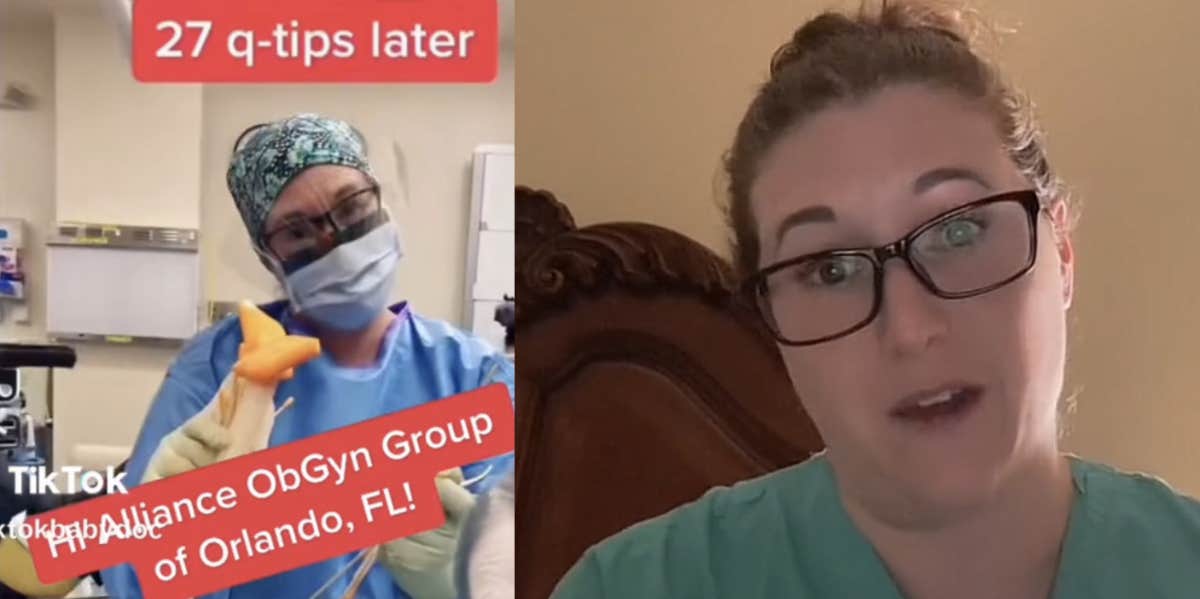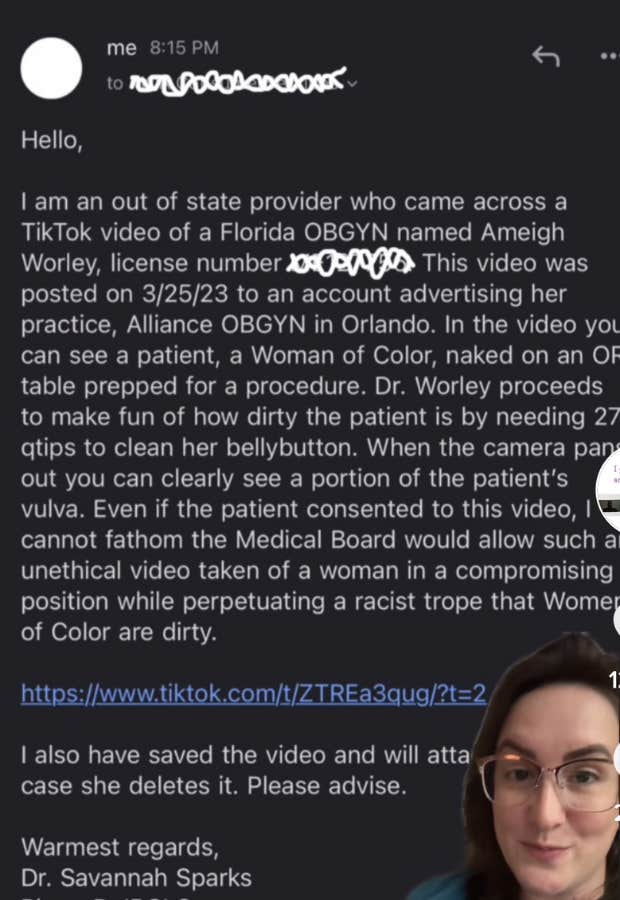Orlando OB-GYN Responds After Posting Video Claiming That Patient Needed 27 Q-Tips To Clean Her Belly Button
People argue that the video is enforcing 'racist tropes' and implies that patients of color are 'dirty.'
 TikTok
TikTok A Florida OB-GYN came under fire after posting a video of a patient during a medical procedure on her TikTok account. In the controversial video, many people believed that the provider was alluding to the patient being unhygienic.
However, she claims that the video was simply meant to be a “parody” of an old saying emphasizing that our bodies can “never be too clean.”
Ameigh Worley, an OB-GYN in Florida, posted a video claiming that a patient needed 27 Q-tips to clean her belly button before surgery.
Worley, who is a board-certified OB-GYN that serves women of all ages at Alliance Obstetrics & Gynecology Group in Orlando, Florida, shared a video on TikTok in March 2023 from the operating room.
The since-deleted footage showed an unidentified patient on the table, with their abdomen prepped for an upcoming procedure, focusing on the belly button. The camera pans down before turning to Worley, who is dressed fully in scrubs, holding Q-tips and cleaning supplies.
 Photo: TikTok
Photo: TikTok
She then comments about the patient requiring 27 Q-tips to clean their belly button.
The footage did not sit well with other OB-GYNs on the platform, and Worley’s video was shared among some physicians who took it upon themselves to call out Worley for her seemingly unprofessional and offensive message.
Others argued that the video promoted racism, with Worley implying that patients of color are ‘dirty.’
M.D. Shannon Clark slammed the OB-GYN in a video of her own, claiming that she appeared to film a patient of color without her consent and made degrading remarks about her hygiene. Clark also pointed out that the patient’s vulva could be seen in the footage.
“Can someone just really quickly remind me why patients have a huge distrust in OB-GYNs these days, especially patients of color?” she says sarcastically.
Savannah Sparks, a doctor of pharmacy, also responded to Worley’s video with one of her own. Sparks argues that Worley “perpetuated the racist trope that women of color, namely Black women, are dirty.”
She sent a complaint email regarding Worley’s services to Alliance OB-GYN. “Even if the patient consented to this video, I cannot fathom the Medical Board would allow such an unethical video taken of a woman in a compromising position while perpetuating a racist trope that Women of Color are dirty,” the email reads.
Additionally, Sparks reported Worley to the Department of Health in Florida.
 Photo: TikTok
Photo: TikTok
Worley responded to the backlash, arguing that her video was taken out of context.
After removing the original video from her page, Worley posted a follow-up video apologizing to anyone she may have offended and explaining the true meaning of the footage. She claims that the purpose of the video is promoting the idea that a patient can never be too clean before a surgical procedure for precautionary measures.
“There’s a saying that we all know about never leaving the house without clean underwear or leaving lint in your belly button,” Worley said. “Never did we imagine that a parody based on that would be misinterpreted as body shaming or being degrading to persons of color.”
She explained that the patient in the video was a medical colleague who gave her consent to post the video before undergoing the procedure. “Prior to surgery, patients are given a special antibacterial cleanser to reduce the amount of germs and particles on the skin. It’s especially important in laparoscopic surgery to thoroughly clean the bellybutton to prevent infection,” Worley shared.
“Once at the hospital, these steps are repeated in the operating room by your surgical team. We posted a video holding many swabs to show that the belly button can never be too clean.”
She says that the video was meant to be humorous, and was soon being “misinterpreted as degrading toward women of color.”
“That was never our intention at all, and I sincerely apologize to anyone if that is how our video came across and was interpreted,” Worley added that she has personally apologized to anyone who reached out to her offended by the video. “Those of you who know us know that we stand for education, empowerment, evidence-based medicine, and entertainment.”
Additionally, she shared that the patient in the video was not a person of color.
“The video was posted with her knowledge and with her consent and it does not show anything more than her abdomen,” Worley alleges. “Without having the background information of who this was and that it was a parody, I can understand that this may have come across as inappropriate.”
Although Worley issued an apology and explained the context of her video, it is true that there are an increased number of patients, specifically patients of color, who distrust their providers due to mistreatment in a medical setting.
According to an October 2020 poll conducted by the Center of Community Alliance for Research and Education at the Cancer Center City of Hope in Los Angeles, 55% of Black Americans claim that they distrust the healthcare system, and 7 out of 10 share that they are treated unfairly by medical professionals.
Many of them report that their pain is under-treated and their concerns are disregarded.
It is essential that all of those working in healthcare strive to establish a more inclusive, and understanding environment so that all of their patients feel heard and safe in their care.
Megan Quinn is a writer at YourTango who covers entertainment and news, self, love, and relationships.

